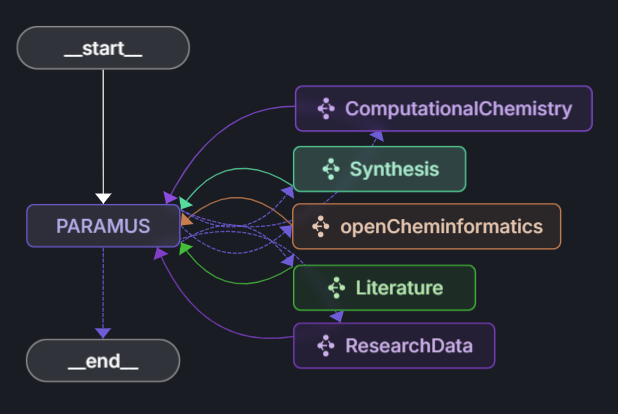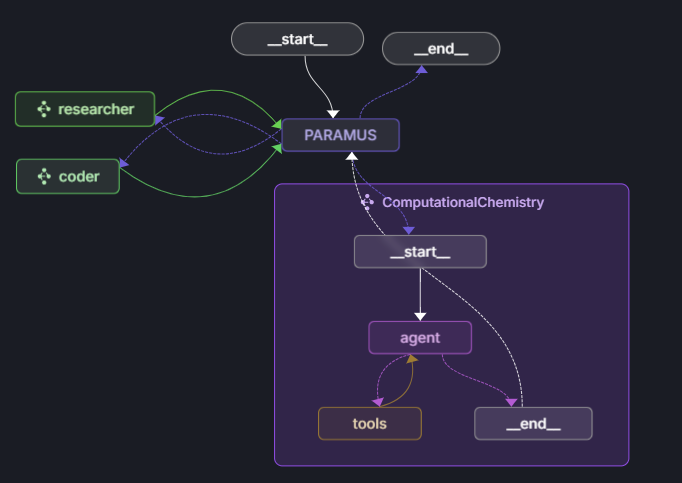FAQ
What does it mean: „can make conclusions“?
The best is to explain by example. Lets assume you have a chemicals inventory database. If you have the agent PARAMUS can query if for a given reaction enough educts are available:

Here you can see that some chemicals are not available. This is a conclusion from the knowledge of the classic Aspirin synthesis together with the query of the inventory. See also that the original question was just about the solvents, but paramus „decided“ to list all main educts.
Technology
Are we ready with our digitalization?
Paramus works better on a high level of digital transformation. But even on standard landscapes you will have a competitive advance.
If you need assistance with an initial assessment, we can evaluate your current maturity level and recommend next steps to move forward in your digital journey.
There are already LLMs with agent infrastructures. So why PARAMUS?
(1) Paramus ‚thinks‘ Chemistry, the agents and tools have internal prompts that are designed with chemistry in mind. General architectures know a lot – but they need to be tuned for our specific field of expertise and workflow. It is a challenge to design prompts for relevant use cases in chemical industry and test them all over the agent infrastructure. Its no so much about the framework, Its about „the orchestration of chemistry in it“.
Basic example: Standard agent system prompt is ‚You are a helpfull agent‘. PARAMUS is (simplified) ‚You are a experienced chemist‘. Even such a small system change has big impact in the functionality!
(2) We also added a basic projects and task management that is helpfull for scientific work. „Just lists of chats“ is not enough for productive work with GPT’s. PARAMUS must know the broader context you are working on.
(3) Trade-off: PARAMUS keeps you up-to-date with the latest agentic technology. There is a dynamic change in this area: speed matters. A cohesive ecosystem can be deployed more quickly.
Do you offer agents without the whole infrastructure?
Each agent is LangGraph-compatible, so basically we can do it. But you will loose the power of the whole PARAMUS graph, the End-to-End Value vs. Single-Use Component. If you integrate an agent you need to figure out the “who calls what, when, and how?”. You also have to manage the meta-logic of chaining multiple agents, handle edge cases, and state management. In our current version we use a ‚orchestrator-worker‘ architecture for PARAMUS Core.

In a system like PARAMUS, each agent might be specialized for a certain domain (e.g., experiments/ELN, time series/reactors, synthesis route handling and call for prediction tools etc.). Because they’re embedded in a larger framework, each agent can pass information to other agents via the supervisor. This synergy means the whole is greater than the sum of the parts.

When multiple agents work under a shared framework, logs, user feedback, and performance metrics can be aggregated across tasks. This consolidated feedback can improve each agent over time and help the orchestrator (PARAMUS) learn (agent) routing strategies or identify bottlenecks.
We recommend to use PARAMUS Itself Can Act as an Agent:
PARAMUS as meta-agent
From the outside, a customer or client application just sees a single interface (the “PARAMUS agent”). Internally, PARAMUS handle the sub-agents. You do not need to wire all these sub-agents yourself; with python simply pip install paramus and call paramus.runTask() endpoint, for example, and let the PARAMUS chemist figure out everything else.
Legal
Access and Permitting Requirements (Chemistry)
PARAMUS not available to the public. You need a professional commercial or academic lab environment and the necessary permits to run it.
U.S. Regulatory Compliance (Artificial Intelligence)
In light of AI guidelines, we only provide PARAMUS to companies or universities that are verified by a U.S. key institution overseeing your chemical activities. Examples are: Evironmental Protection Agency (EPA), Occupational Safety and Health Administration (OSHA), Drug Enforcement Administration (DEA), U.S. Food and Drug Administration (FDA), Nuclear Regulatory Commission (NRC), Department of Homeland Security (DHS), or state-level agencies (e.g., California Department of Toxic Substances Control).
A relevant verification must be presented.
We only provide the product within the United States; due to complex questions in EU regulation it is currently not available in the European Union*) or other world regions. *) U.K. and Switzerland may be on request